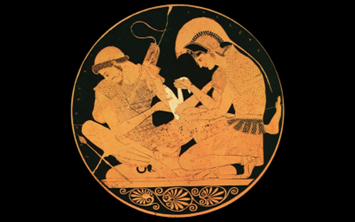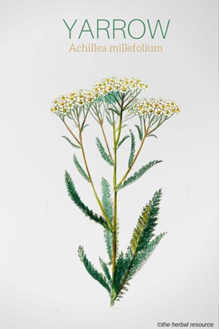What is Yarrow?

Yarrow is the common name for the above-ground parts of the plant Achillea millefolium L., herba. Its scientific name, Achillea millefolium, comes from Greek mythology. In Greek mythology, Achilles was the strongest warrior and hero in the Greek army during the Trojan War. The genus name Achillea is in fact derived from the belief that Achilles, used this plant to treat the wounds of his comrades-in-arms. In Latin the Romans referred to it as “Militaris herba”, meaning official military herb. Its name in Irish was “Lus chosgadh na fola”, the plant that stops bleeding or “Lus na fola”, the blood weed. It is clear that the healing and medicinal benefits of yarrow have been coveted for thousands of years.

Family: Asteraceae
Genus: Achillea
Species: A. millefolium
Common names: Bloodwort, Carpenter’s weed, Devil’s plaything, Devil’s nettle, Herbe militaris, Knight’s milfoil, Milfoil, Military herb, Nosebleed, Old man’s pepper, Sanguinary, Soldier’s woundwort, Staunchweed, housand weed, Yarroway
Habitat: native to Europe, northern Asia, and the Caucasus, and has been introduced into North America, Australia and New Zealand.
Flowers: May to July
Can Yarrow help to heal wounds?
Herbal preparations of Achillea millefolium L. or Yarrow as it is commonly known, can be approved by the European Medicines Agency as a Traditional herbal medicinal product for the treatment of small superficial wounds in adults exclusively based upon long-standing use1. Yarrow products for use in small superficial epidermal excoriation and minor skin injuries have been for sale in Poland for more than 30 years1.
Evidence from studies
There are limited human clinical trials investigating the use of Yarrow in wounds but those that have been conducted have shown positive benefits without any undesirable effect 1,2. Oil based Yarrow extracts demonstrated significant anti-inflammatory effect in a study with 23 volunteers on artificially irritated skin2. Skin parameters assessed in the study; skin capacitance which relates to skin hydration levels, pH and erythema or irritation index were restored to the starting values after three- and seven-day treatment with the tested extracts, and the effects were proven not to be attributed to just the sunflower and olive oil vehicles themselves2. Another study used alcohol extracts of Yarrow which were incorporated into sterile Vaseline and applied to episiotomy wounds of 140 women following childbirth3. In the study it was observed that the Yarrow extract ointments were more effective in reducing redness, swelling and bruising of episiotomy wound (p<0.05) compared to the placebo which was Vaseline ointment alone3.
Animal studies have also found that Yarrow extracts have potential as wound healing agents. An ointment composed of both oil and alcohol extracts of Yarrow was seen to exert a wound healing effect on incision, excision, and thermal burn wounds in rats compared to the control or blank ointment in a study conducted in 20204. Additionally, a lipophilic extract of Yarrow was been tested for antimicrobial activity in a disk diffusion assay against 5 bacteria (Staphylococcus aureus, Escherichia coli, Klebsiella pneumoniae, Pseudomonas aeruginosa and Salmonella enteritidis) and 2 fungi (Aspergillus niger and Candida albicans). The extract possessed a broad spectrum of antimicrobial activity against all tested strains5.
Where can I buy skin products that contain Yarrow?
Due to the multitude of potential benefits, there are many skin products on the market that contain Yarrow as an active ingredient. Copper Hawk Natural Animal First Aid is one such product that is used as a barrier ointment to protect minor wounds. Copper Hawk is a petrolatum-based infusion of 5 naturally occurring botanical extracts, including Yarrow, Gotu Kola, Common Plantain, Figwort, and Pau D’Arco. Individually these traditionally-used herbs have been seen to accompany accelerated healing of affected skin such as wounds, burns, ulcers and support hair regrowth, while also having a natural scent that can prevent animals from licking the affected area. To realize the benefits of Yarrow and this topical barrier ointment, go to the CopperHawk Online Shop to purchase it for your horse, cat or dog today!
References
- Millefolii herba | European Medicines Agency (europa.eu)
- Tadić V, Arsić I, Zvezdanović J, Zugić A, Cvetković D, Pavkov S. The estimation of the traditionally used yarrow (Achillea millefolium L. Asteraceae) oil extracts with anti-inflamatory potential in topical application. J Ethnopharmacol. 2017 Mar 6;199:138-148. doi: 10.1016/j.jep.2017.02.002. Epub 2017 Feb 3. PMID: 28163113.
- Hajhashemi M, Ghanbari Z, Movahedi M, Rafieian M, Keivani A, Haghollahi F. The effect of Achillea millefolium and Hypericum perforatum ointments on episiotomy wound healing in primiparous women. J Matern Fetal Neonatal Med. 2018 Jan;31(1):63-69. doi: 10.1080/14767058.2016.1275549. Epub 2017 Feb 23. PMID: 28027682.
- Andritoiu CV, Andriescu CE, Ibanescu C, Lungu C, Ivanescu B, Vlase L, Havarneanu C, Popa M. Effects and Characterization of Some Topical Ointments Based on Vegetal Extracts on Incision, Excision, and Thermal Wound Models. Molecules. 2020 Nov 16;25(22):5356. doi: 10.3390/molecules25225356. PMID: 33207838; PMCID: PMC7709045.
- Yarrow Image – Image copyright (C) 2010 The Herbal Supplement Resource” – https://www.herbal-supplement-resource.com/yarrow-herb.html
Stojanović G, Radulović N, Hashimoto T, Palić R. In vitro antimicrobial activity of extracts of four Achillea species: the composition of Achillea clavennae L. (Asteraceae) extract. J Ethnopharmacol. 2005 Oct 3;101(1-3):185-90. doi: 10.1016/j.jep.2005.04.026. PMID: 15978758.
